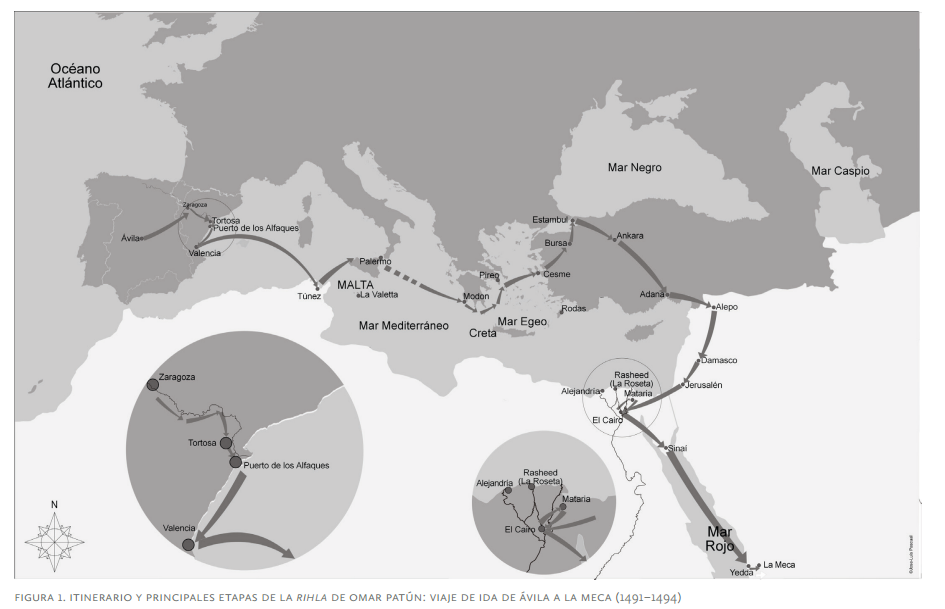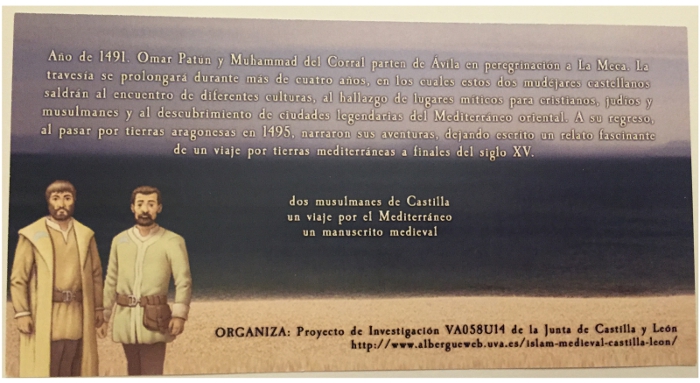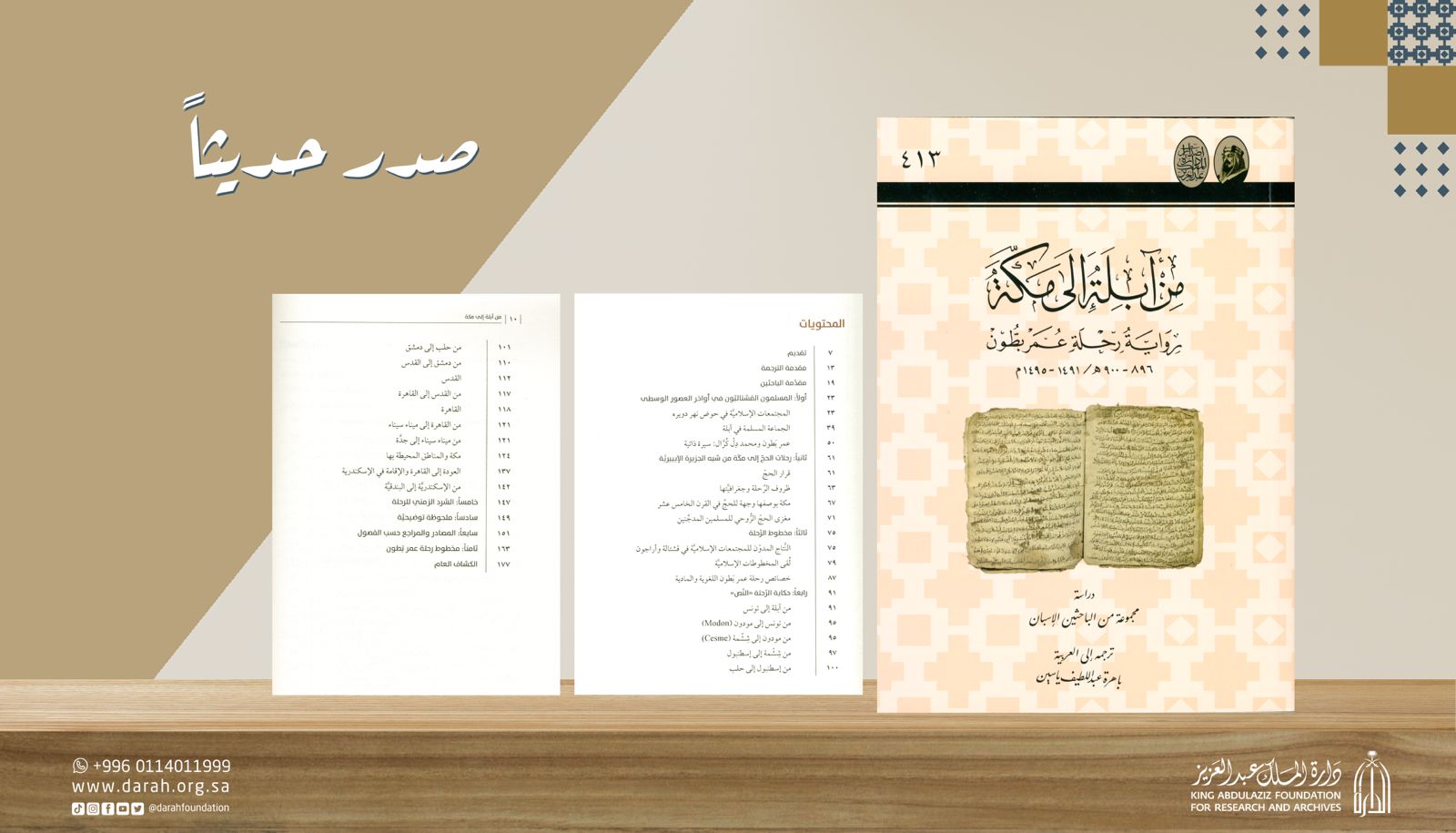From Avila to Mecca. The pilgrimage (hajj) travel story of Omar Patún (1491-1495)
From Avila to Mecca. The account of the journey of Omar Patoun (1491-1495) In 1988, a sack containing nine Islamic manuscripts was found hidden inside a party wall of a house in the town of Calanda (Aragon, Spain). Nine Islamic manuscripts that lay forgotten there for about six centuries. These manuscripts were deposited there by an Aragonese Muslim during the 16th or early 17th century, before Spanish Muslims were expelled from Spain by decree in the early 17th century.These manuscripts are currently deposited in the Library of the Cortes de Aragón (Spain) and can be consulted on the website of this institution, which makes an excellent digital copy of them available to all those interested.
Among these manuscripts, the one containing the account of the pilgrimage to Mecca by a Muslim from Avila, Omar Patun, at the end of the 15th century, stands out for its content. It is a first-person account in which Omar Patoun gives an account of his adventures during his pilgrimage journey. It is the only surviving account of a pilgrimage by a Castilian Muslim from the 15th century. This makes this manuscript a unique work of great importance. The text is written in Castilian, but using the Arabic alphabet, i.e. in aljamiado-Arabic Castilian.
Xavier Casassas Canals made this story known within the framework of a series of conferences at Casa Velázquez in 2014. He went on to publish an article in which he gives an approach to the pilgrimage story and its main stages: "La Rihla de Omar Patún: el viaje de peregrinación a la Meca de un musulmán de Ávila a finales del siglo XV (1491-1495) = Omar Patún's Rihla : The Journey of the Pilgrimage to Mecca of a Muslim from Ávila at the End of the Fifteenth Century (1491-1495)", in Espacio, Tiempo y Forma III. Medieval History, no. 28 (2015), pp. 221-254.

Xavier Casassas Canals subsequently published in the collective work De Ávila a La Meca. El relato del viaje de Omar Patún (1491-1495), written together with professors Olatz Villanueva Zubizarreta, Serafín de Tapia Sánchez, Javier Jiménez Gadea and Ana Echevarría, the complete version of this account of the pilgrimage. It is a modernised version faithful to the original text. A complete photographic copy of the original manuscript was also published in this book.
From 20 October 2017 to 28 January 2018, the temporary exhibition "From Avila to Mecca. The pilgrimage of two Mudejars". As part of the opening of this exhibition, on 20 October 2017, a presentation of the book De Ávila a La Meca. El relato del viaje de Omar Patún (1491-1495) by Olatz Villanueva Zubizarreta, Javier Jiménez Gadea and Xavier Casassas Canals, followed by the concert "Viaje musical por el Mediterráneo" by the group Faluka
 |
A comparative study of Omar Patun's pilgrimage account with other similar accounts by Castilian and Aragonese Muslims can be found in "Tres rihlas mudéjares: el viaje de peregrinación a La Meca de los musulmanes castellano-aragoneses durante los siglos XIV-XVI", published by Casassas Canals in the workCirculaciones mudéjares y moriscas: redes de contacto y representaciones published by Alicia Kadri, Yolanda Moreno Moreno and Ana Echevarría Arsuaga.
Also interesting is the comparison that Casassas Canals makes between Omar Patun's account of pilgrimage to Mecca and the Swiss cleric Felix Fabri's account of pilgrimage to Jerusalem, in "Loca Sancta: Interreligious Contact and Convergence in the Holy Land in the 15th Century in Felix Fabri's Evagatorium (1483-1484) and Omar Patun's Rihla (1491-1495)" published in Religious Plurality and Interreligious Contacts in the Middle Ages published by Ana Echevarría Arsuaga and Dorothea Weltecke.
On 31 August 2020 the programme "Historias y Leyendas" of Radio Clásica (Spain) dedicated a one-hour programme entitled "Omar Patún: el viaje medieval de un abulense a La Meca", in which a reading is made of part of the text of Omar Patún published in the book De Ávila a La Meca (From Avila to Mecca). The story of the journey of Omar Patoun (1491-1495). The full programme can be listened to, or downloaded, on the Radio Clásica website: Full programme of "Omar Patún: the medieval journey of a man from Avila to Mecca".
On Omar Patún see also the article by Jesús Rodríguez Plaza, from the University of Valladolid, "De Medina (del Campo) a La Meca: La actividad profesional de Omar Patón en Medina del Campo" (From Medina (del Campo) to Mecca: The professional activity of Omar Patón in Medina del Campo). Summary of this article: "At the end of 1491, the Muslim from Avila, Omar Patón, set out on his pilgrimage to Mecca and, precisely, certain medieval documentation in the Municipal Archive of Medina del Campo contains unpublished information about Patón's professional activity as a builder on the works on the fence of the Villa de las Ferias shortly before his departure. In this article we propose an analysis of his participation in these works, of his relationship and links with other colleagues involved at the same time in this and other contracts (mainly Mahomad Patón and Brayme Leta) and of the consequences of his departure for the development of the Medina commissions. We will also offer some observations on the work that the master builder may have carried out during his journey to pay for it, and the quotations in his account of his pilgrimage or his relationship with his trade, which sheds further light on the biography of the character.
|
The King Abdulaziz Foundation for Research and Archives (Riyadh, Saudi Arabia), has published an Arabic translation of the book "De Ávila a La Meca. El relato del viaje de Omar Patún (1491-1495)". The translation, by Bahira Abdulatif, is entitled
رحلة عمر بَطُّون من إسبانيا إلى مكة المكرمة and was published in 2022 in Riyadh.
News of the publication of the work and its description on the King Abdulaziz Foundation website (in Arabic). الدارة تصدر اول ترجمة عربية لـرحلة عمر بَطُّون من إسبانيا إلى مكة المكرمة |

|